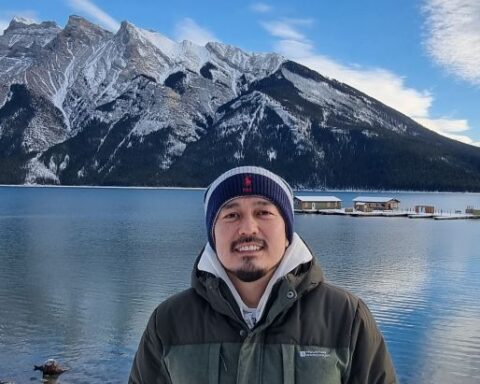For some Muslims in Canada, the events of Sept. 11 cling to their collective memory like a dark stain, penetrating so deep into the fabric of the community that its presence is still felt 13 years later.
“The vast majority of Muslims opposed that barbarism and today remain horrified with what happened,” says Abdul Souraya, immigration lawyer and co-chair of the Calgary Police Middle East advisory Committee.
“Sometimes the community is painted with a very large brush. And there’s a collective punishment and anguish that goes with that.”
That sentiment is particularly fresh in Calgary, the hometown of five young men who reportedly joined an Islamic extremist group and were subsequently killed in action overseas in the last year.
Souraya was one of the presenters at this year’s OWN IT 2014 – a four-day conference organized by Calgary Muslim groups. Government officials, community leaders, academics and police convened to discuss how to prevent criminal radicalization at a southwest Calgary mosque.
The summit, held intentionally on Sept. 11, was a way to take ownership of the public narrative, and to highlight strides made by the city’s Islamic groups to uproot any hint of extremism on the home turf.
We want to be able to live again in a safe, secure environment where people are free to do what they want to do within the confines of the law and not have to worry about their faith being an impediment to their happiness or their progress in life.
Re-living the shock
Souraya says the recent high profile deaths of young Calgarians linked to Islamic extremism shook the city’s Muslim community to the core, forcing them to relive the same shock, helplessness and frustration of years past.
Federal officials say they’re aware of at least 130 people with Canadian connections who were “suspected of supporting terrorism-related activities”. Local police suspect at least 30 of them are from Calgary, and five men have already been publicly named in news media reports.
Souraya insists the conference was “not a reactive or apologetic public relations gesture” – nor does it intend to take responsibility for the actions of the alleged perpetrators.
“A lot of people assume that when something happens affecting a Muslim individual, they almost expect a Muslim reaction from the community,” says Souraya. “In fact there are some critics who would say the Muslim community is not rejecting or opposing enough.”
Empowering youth took precedence during the talk and tough questions were asked. Why does extremism take hold? What informs that behaviour? Is it solely through online propaganda or are there recruiters embedded within the community shaping impressionable young minds? What red flags should parents watch for?
Close to home
The conference hit close to home for Christianne Boudreau, whose 22-year-old son, Damian Clairmont, was reportedly killed fighting with ISIS (Islamic State in Iraq and Syria) in Syria in December or January of this year. Boudreau has been calling on the Canadian government to take action on de-radicalization, but says her cries have fallen on deaf ears. She has now launched her own program aimed at dealing with future cases of Canadians who might be attracted to join overseas conflicts – so that other parents don’t have to go through the same grief and unanswered questions she continues to experience.
New Canadian Media first spoke with Boudreau in an exclusive interview last February.
Boudreau says time hasn’t eased her pain. In her search for answers, she has discovered families in Europe who have also recently lost children to Islamic extremist groups. This past summer, she travelled to France and Germany to meet with those families – an experience that has helped her find some meaning and has fuelled her desire to establish a similar support network on Canadian soil.
She says the conference has given her “a ray of hope,” especially given the high-ranking officials in attendance, pledging to be a part of the solution.
“Seeing so many people verbalize it out loud, so now they’re accountable for it, big difference,” says Boudreau.
Reaching out
Calgary Police Chief Rick Hanson says he thinks there will be more concrete action than in the past because the conference has pulled together “an action-oriented group,” rather than one that simply spouts long-winded academic jargon about extremism but fails to do anything about it.
Although radicalization is federal jurisdiction, Hanson says much work is already being done at the grassroots level, reaching out to students from elementary to high school.
“Within a municipal environment, our role, primarily, is the early intervention, prevention, education and working with the communities to prevent this from happening in the first place,” says Hanson.
He is convinced Calgary isn’t immune to extremist recruitment campaigns that have been known to infiltrate other parts of the world. He insists youth need more than just online propaganda to cross over into radical territory.
Sometimes the community is painted with a very large brush. And there’s a collective punishment and anguish that goes with that.
“Reading something on a screen, if you’re an average person, that’s not good enough,” he says. “There has to be tangible efforts to move you forward into that in a way that is more than just reading a book or reading something on a screen.”
Hanson likens the recruitment technique adopted by extremists to gangs, an effective strategy in making wayward youth feel as though they have a new family.
“[Recruiters] are looking for young men or women who feel unengaged. They don’t connect to society. They’re looking for a reason, a purpose, something greater than themselves,” says Hanson, adding that the issue cuts across all ethno-cultural communities.
Hanson says he’s working on how to differentiate criminal activity from terrorism in its early stages, and how to monitor it. He says the young Calgarians who were killed, such as Damian Clairmont, managed to slip through the cracks – especially since Calgary Police has only been running the intervention program for a few years, and it may have been too late for some youth who were already radicalized.
“It’s a community-based approach where those families, those friends, those people out there, who start to see the recruitment happening, they feel that they can call someone,” says Hanson, who adds that many of the families involved didn’t even know who to reach out to for help.
No simple solution
Ihsaan Gardee, Executive Director of the National Council of Canadian Muslims (NCCM) says there is a temptation “to find the magic bullet” and uproot criminal radicalization, but it’s not so simple.
“There’s no single pathway for individuals to go from being a productive, contributing member of society to being somebody who espouses and supports and takes part in violence inspired by extremist ideology,” says Gardee, on behalf of the Muslim civil liberties and human rights organization, a conference partner.
He says there’s a need to understand the complexity of the problem and to address it in a comprehensive way, looking at short term and long-term solutions.
In the short term, this means identifying factors that make someone more vulnerable to the slick propaganda that violent extremists may use and working with partners at all levels of society – from government stakeholders to educational institutions – to stop it.
Long-term strategies may have to with debunking and “de-glamorizing” deep-rooted violent extremist ideology as a way to reduce its ability to influence youth.
“The reality is that this is far from glamorous and the comforts of life that they’ve enjoyed [in Canada] … If we can communicate that and have authentic actors to communicate with youth, who are already viewed as being ‘credible,’ the message is going to be that much more effective,” says Gardee.
For the present, however, Souraya says he hopes the current climate doesn’t negatively impact life for youth who are far removed from instances of extremism on Canadian soil.
Souraya says parents are concerned heightened investigation could lead to surveillance of Canadian youth.
“We don’t want that to be a by-product of the actions of other people,” he says. “We want to be able to live again in a safe, secure environment where people are free to do what they want to do within the confines of the law and not have to worry about their faith being an impediment to their happiness or their progress in life.”




